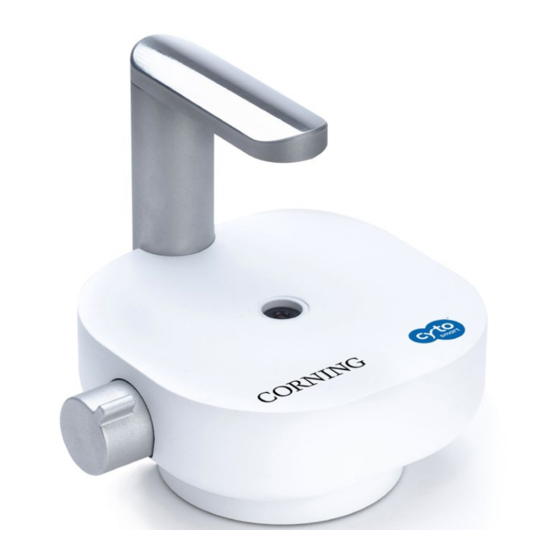CORNING Cell Counter Gebruiksaanwijzing - Pagina 12
Blader online of download pdf Gebruiksaanwijzing voor {categorie_naam} CORNING Cell Counter. CORNING Cell Counter 15 pagina's. Accurate cell counts in a flash

Troubleshooting
(Continued)
No cells are
This may be due to cell concentration of the sample being below
visible
5 x 10
5
cells/mL, which is below the operating range of the Corning®
Cell Counter (Figure 27). To resolve this, pellet the solution by
centrifuging and resuspend the cells in a smaller volume.
Another cause may be that the bulk sample solution has been left
to stand for some time. Cells have then gravitated towards the
bottom of the vial. By pipetting the suspension up and down before
loading the counting chamber, you should obtain a homogenous cell
suspension.
WARNING! This count is below our optimum counting range (5.0 x 10
Figure 27. Warning message: not enough cells to count
Too many cells
This may be due to cell concentrations being above 1 x 10
(Figure 28). Dilute your cell suspension to obtain a lower concentration
and count again.
WARNING! This count is above our optimum counting range (1.0 x 10
Figure 28. Warning message: too many cells to count
Cell clumps
Cells can aggregate into clumps, leading
to false results when analyzed (Figure 29).
When cell clumps are visible, prepare a
new sample. By gently resuspending the
stock cell suspension, aggregates can be
broken down.
22
C O R N I N G C E L L C O U N T E R
5
cells/mL).
7
cells/mL
7
cells/mL).
Figure 29. Cell clump
example
Bubbles
While looking at the images in the
CytoSMART™ Cloud App, you may
see bubbles (Figure 30). They are
recognizable as big black circles.
Bubbles can lead to false results, as they
influence the distribution of cells and
the volume inside the counting chamber.
The cause for bubbles is often due to
incorrect pipetting. Thus, make sure no
air is included during pipetting a new
sample.
Debris
When looking at the images from the
CytoSMART Cloud App, you may see (cell)
debris (Figure 31). This may be caused by
not having properly cleaned the counting
chamber. To resolve this, properly clean
the counting chamber before loading a
new sample.
Figure 30. Air bubble
example
Figure 31. Debris present
in the counting chamber
Instruction Manual
23
